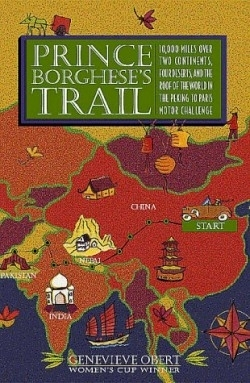Prince Borghese's Trail
We would descend from 16,000 feet to only 3,200; most of that drop happened within sixty miles of very twisting road. As narrow as six feet in places, the road was carved into the side of the mountain. Even the organizers…said this is the worst road in the world.
Obert, a freelance automotive journalist from Santa Cruz, California, is describing just one leg—from Tibet to Kathmandu, Nepal—of her 10,250 mile, forty-three day journey in the fall of 1997 as part of a contingent of ninety-three vintage automobiles recreating a similar such feat which occurred ninety years earlier.
In her story she parallels her travels with that of Italian Prince Scipione Borghese who won the 1907 rally. Traveling with Borghese was journalist Luigi Barzini, who told their story.
Obert and her co-driver, another California woman she?d met just six months earlier, finished the grueling competition and placed thirty-second overall; the duo also won the Women’s Cup. Obert explains how she—a nearly-forty-year-old wife and mother of two—winds up halfway across the world, competing alongside German, British, Dutch and Iranian roadsters.
She writes in a very personable, friendly style, baring her feelings in honest narrative: “When I’m on the road, I talk all the time.” She discovers this habit is bothersome to her co-driver, with whom she alternates driving and navigating. As they later speed down a stretch
of new Chinese highway, the chastised author rejoices in the deafening noise. “It made my innocuous, irritating conversation unnecessary.”
The book consists of 48 short chapters, each roughly corresponding to each day’s travel; one chapter, for example, is “Quetta, Pakistan to Azhedan, Iran (Tuesday, September 30).”
Each chapter details events occurring that day, ranging from problems with their car (a bruised suspension) and the sights they saw (the
Great Wall) to the citizens of each country they met (the stone throwing men and boys in the town of Khomein, Iran, birthplace of the Ayatollah) and their co-ralliers (the German father and son team that suffers a tragic accident).
Obert begins each chapter with a suitable quote from the Barzini account and often examines historical side-subjects, such as the whirling
dervish ceremony she witnesses in Turkey.
Despite the hardships, it seems to have been a trip Obert enjoyed on several levels, as evidenced by the whimsical touch of a small cartoon car seen traversing along the bottom of each page.
Reviewed by
Robin Farrell Edmunds
Disclosure: This article is not an endorsement, but a review. The publisher of this book provided free copies of the book to have their book reviewed by a professional reviewer. No fee was paid by the publisher for this review. Foreword Reviews only recommends books that we love. Foreword Magazine, Inc. is disclosing this in accordance with the Federal Trade Commission’s 16 CFR, Part 255.

